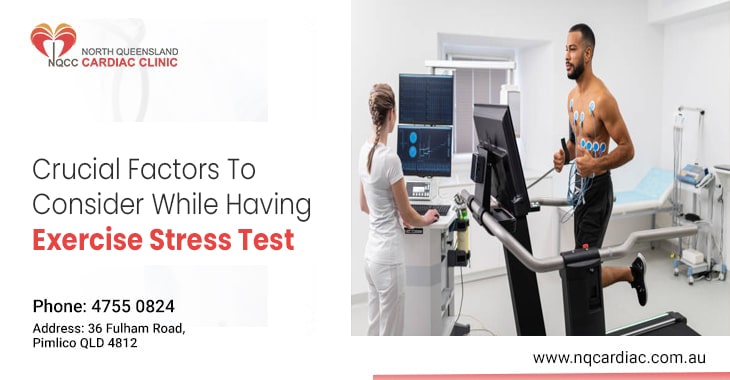An Exercise Stress Test, often called a treadmill test or a stress ECG, is an important diagnostic technique medical practitioners use to assess cardiovascular fitness, evaluate heart health, and spot potential problems. The patient works on a treadmill during this test while their heart rate, blood pressure, and ECG are tracked. It gives important details about how the heart reacts to physical effort and can aid in diagnosing several cardiac diseases. If you want to get a safe Exercise Stress Echocardiogram Test Pimlico, contact North Queensland Cardiac Clinic.
At NQCC, we have skilled cardiologists, Dr Dharmesh Anand and Dr Raibhan Yadav and other professionals who can conduct an accurate and safe Exercise Stress Echocardiogram Test.
Let’s see the vital factors to remember:-
- Medical History
- Medications
- Fasting Guidelines
- Comfortable clothing and shoes
- Hydration
- Exercise Tolerance
- Communicate During the Test
- Follow Post-Test Instructions
- Dissect the outcomes and next steps
Medical History:
Your healthcare professional will review your medical history before you undergo an exercise stress test. You must disclose the specifics of any ongoing medical illnesses, medications you are taking, allergies, and prior heart-related difficulties. This data enables the medical staff to customise the test to your particular requirements and assures your safety during the procedure.
Medications:
If you take any medications for your heart, talk to your healthcare professional about them. Before the test, some drugs may need to be changed or temporarily stopped. The best course of action to get accurate results while keeping you safe will be decided by your doctor.
Fasting Guidelines:
A few hours of fasting before the test may occasionally be required. Depending on the kind of stress test you’re having, this need may change. It is essential to adhere to the fasting rules To avoid interfering with the test findings.
Comfortable clothing and shoes:
Dress comfortably and step out in supportive athletic footwear. Your clothing should be comfortable because you’ll move about easily while running or walking on a treadmill. Avoid wearing tight clothing that can limit your range of motion or interfere with how the ECG electrodes are placed.
Hydration:
Drink plenty of water before the Exercise Stress Test. Dehydration can make the test more difficult to complete and impact the accuracy of the results. Before the test, follow your healthcare provider’s advice and drink plenty of water.
Exercise Tolerance:
Recognise your capacity for exercise and any symptoms you may encounter when exercising. Let the medical staff know if you have ever had chest pain, breathlessness, dizziness, or any other unsettling symptoms while exercising. They’ll keep a tight eye on you to ensure you’re safe.
Communicate During the Test:
Keep lines of communication open with the medical professionals throughout the exercise stress test. Do not hesitate to inform them if you feel any pain, discomfort, or other strange symptoms. They will modify the exam properly and offer help if necessary.
Follow Post-Test Instructions:
Your healthcare professional will provide you post-test instructions following the stress test. These directions can suggest that you resume regular activities, make any required medication modifications, or undergo more testing, if necessary. You must carefully adhere to these directions to protect your safety.
Dissect the outcomes and next steps:
Lastly, go through your exercise stress test outcomes with your doctor. They will analyse the data and decide on the best course of action, which can involve making lifestyle or medication adjustments or doing more cardiac testing.
Conclusion
An Exercise Stress Test can aid a cardiovascular condition’s diagnosis and assessment. You can guarantee the accuracy of the results and your safety during the procedure by considering these important elements before, during, and after the test. If you opt for an effective Exercise Stress Echocardiogram Test Pimlico, contact North Queensland Cardiac Clinic.


